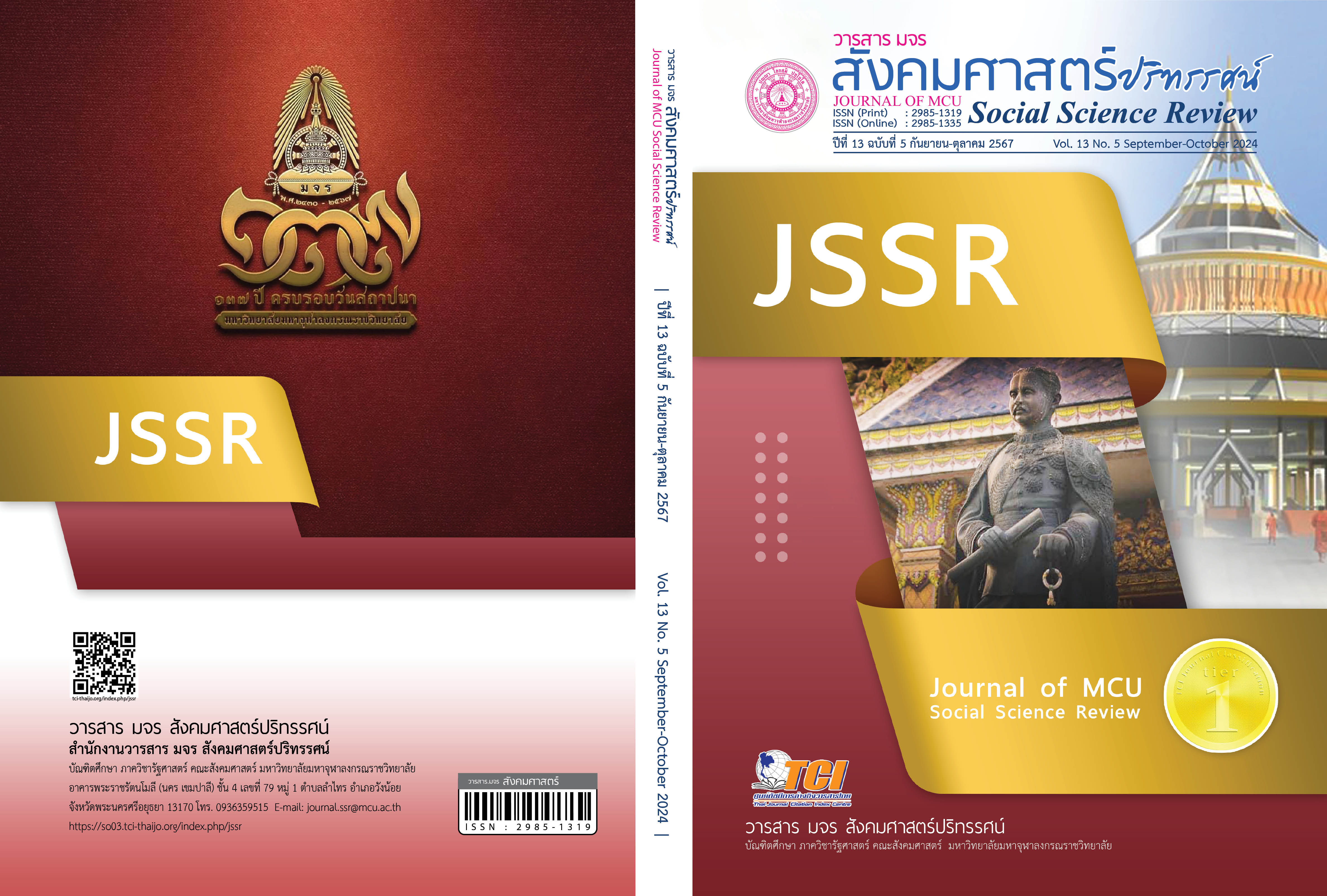การประเมินหลักสูตรวิชาภาษาไทย วัฒนธรรมไทย และประวัติศาสตร์ไทย ระดับมัธยมศึกษาตอนต้น โรงเรียนนานาชาติเชียงใหม่
คำสำคัญ:
การประเมินหลักสูตร, รูปแบบการประเมินของ Stake, ระดับมัธยมศึกษาบทคัดย่อ
บทความวิจัยนี้มีวัตถุประสงค์เพื่อประเมินหลักสูตรวิชาภาษาไทย วัฒนธรรมไทยและประวัติศาสตร์ไทย ระดับมัธยมศึกษาตอนต้น โรงเรียนนานาชาติเชียงใหม่ โดยใช้รูปแบบการประเมินของ Stake ใน 3 ด้าน ได้แก่ 1. ด้านสิ่งที่มีอยู่ 2. ด้านกระบวนการดำเนินงาน และ
3. ด้านผลที่ได้รับ เก็บข้อมูลจากนักเรียน 88 คน ผู้ปกครอง 32 คน ครู 7 คน ผู้บริหารโรงเรียน 3 คน และผู้ทรงคุณวุฒิ 5 คน วิเคราะห์ข้อมูลโดยการหาค่าเฉลี่ย ค่าเบี่ยงเบนมาตรฐานและค่าร้อยละ รวบรวมข้อมูลจาก 1. แบบวัดความพึงพอใจของนักเรียนและผู้ปกครอง 2. แบบวัดเจตคติของนักเรียน 3. แบบบันทึกข้อมูลเอกสาร และ 4. แบบประเมินหลักสูตร แบ่งเป็นเกณฑ์ 5 ระดับคือ เหมาะสมมากที่สุด เหมาะสมมาก เหมาะสมปานกลาง เหมาะสมน้อย และเหมาะสมน้อยที่สุด โดยกำหนดการผ่านเกณฑ์การประเมินที่ค่าเฉลี่ย 3.51 หรือร้อยละ 60 ขึ้นไป
ผลการวิจัยพบว่า ด้านสิ่งที่มีอยู่ ได้ผลการประเมินตามเกณฑ์ร้อยละ 60 หมายถึง ผลการประเมินในภาพรวมผ่านเกณฑ์การประเมิน ด้านกระบวนการดำเนินงาน มีค่าเฉลี่ย 4.13 หมายถึง กระบวนการดำเนินงานมีความเหมาะสมมาก ตามมาตรฐานของกระทรวงศึกษาธิการ และด้านผลที่ได้รับ แสดงให้เห็นถึงนักเรียนที่มีผลสัมฤทธิ์ทางการเรียนร้อยละ 80 ขึ้นไป มีค่าเฉลี่ยร้อยละ 94.29 อยู่ในระดับดีมาก ทั้งนี้ ค่าเฉลี่ยโดยรวมของเจตคติของนักเรียน และความพึงพอใจของนักเรียนและผู้ปกครอง อยู่ในระดับปานกลาง ไม่ผ่านเกณฑ์การประเมิน
เอกสารอ้างอิง
กลุ่มงานโรงเรียนนโยบายพิเศษ. (2558). หลักสูตรวิชาภาษาไทย วัฒนธรรมไทย และประวัติศาสตร์ไทย สำหรับโรงเรียนในระบบ ประเภทนานาชาติ. กรุงเทพฯ: สำนักงาน ปลัดกระทรวงศึกษาธิการกระทรวงศึกษาธิการ.
ชัยวัฒน์ สุทธิรัตน์. (2561). การพัฒนาหลักสูตร : ทฤษฎีสู่การปฏิบัติ (พิมพ์ครั้งที่ 7). กรุงเทพฯ: วีพรินท์.
นิรมล ศตวุฒิ. (2560). การพัฒนาหลักสูตร (พิมพ์ครั้งที่ 6). กรุงเทพฯ: สำนักพิมพ์มหาวิทยาลัย รามคำแหง.
แนวหน้า. (2565). ส่องธุรกิจโรงเรียนนานาชาติ โอกาส-อุปสรรคในลำปาง. สืบค้น 20 มีนาคม 2566, จาก https://www.naewna.com/local/694517
บุญชม ศรีสะอาด. (2556). วิธีการทางสถิติสำหรับการวิจัย เล่ม 1 (พิมพ์ครั้งที่ 5). กรุงเทพฯ: สุวีริยาสาส์น.
บุญเลี้ยง ทุมทอง. (2553). การพัฒนาหลักสูตร (Curriculum Development). กรุงเทพฯ: สำนักพิมพ์แห่งจุฬาลงกรณ์มหาวิทยาลัย.
พิชิต ฤทธิ์จรูญ. (2565). เทคนิคการประเมินหลักสูตร. นครปฐม: เพชรเกษมการพิมพ์.
โรงเรียนนานาชาติเชียงใหม่. (2561). หลักสูตรสถานศึกษาและแผนการจัดการเรียนรู้วิชาภาษาไทย วัฒนธรรมไทย และประวัติศาสตร์ไทย. เชียงใหม่: โรงเรียนนานาชาติ เชียงใหม่.
สมเกียรติ อินทสิงห์. (2563). การบริหารหลักสูตรสถานศึกษา. เชียงใหม่: มหาวิทยาลัยเชียงใหม่.
สมเกียรติ อินทสิงห์ และคณะ. (2560). การประเมินหลักสูตรศึกษาศาสตรมหาบัณฑิต สาขาวิชาหลักสูตรการสอนและเทคโนโลยีการเรียนรู้ แขนงวิชาเทคโนโลยีทาง การศึกษา มหาวิทยาลัยเชียงใหม่. เชียงใหม่: มหาวิทยาลัยแม่โจ้.
สมบัติ พิมพ์จันทร์. (2561). ความพึงพอใจของผู้ปกครองต่อการจัดการศึกษา โรงเรียนมารีย์อนุสรณ์ อำเภอเมืองบุรีรัมย์ จังหวัดบุรีรัมย์ (รายงานการวิจัย). บุรีรัมย์: ฝ่ายพัฒนาคุณภาพการศึกษาและบุคลากร โรงเรียนมารีย์อนุสรณ์ อำเภอเมืองบุรีรัมย์ จังหวัดบุรีรัมย์.
สิทธิพล อาจอินทร์. (2563). การประเมินหลักสูตร : ทฤษฎีและปฏิบัติ. ขอนแก่น: มหาวิทยาลัยขอนแก่น.
Bayuk, N. K. (2019). An Evaluation of Mathematics Learning Program at Primary Education Using Countenance Stake Evaluation Model. Jurnal Penelitian dan Evaluasi Pendidikan, 23 (2), 156-169.
Dewantara, I. P. M. (2017). Stake Evaluation Model (Countenance Model) in Learning Process Bahasa Indonesia at Ganesha University of Educational. International Journal of Language and Literaturet, 1(1), 19-29.
Elen, J. P. (2019). Evaluation of Outcomes-Based Private Junior High School English Curricula. International Journal of Curriculum and Instruction, 1(1), 43-64.
Gordon, W. F. et al. (2019). Developing the Curriculum (9th ed.). New York: Pearson Education.
Jarisah, G. T. (2018). The Evaluation of Post PT3 Program Using Stake's Countenance Model. Malaysian Journal of Social and Humanities, 3(4), 109-118.
Muhammad, I. Q. & Hishan, S. S. (2019). Evaluation of Principal Partnership Programs in Directorate of Education Management - The Application of Kirkpartick and Countenance Stake Evaluation Model. Universal Journal of Education Research, 7 (9B), 71-77.
Talla, M. (2012). Curriculum Development: Perspectives, Principle and Issues. India: Pearson Education in South Asia.
ดาวน์โหลด
เผยแพร่แล้ว
รูปแบบการอ้างอิง
ฉบับ
ประเภทบทความ
สัญญาอนุญาต
ลิขสิทธิ์ (c) 2024 วารสาร มจร สังคมศาสตร์ปริทรรศน์

อนุญาตภายใต้เงื่อนไข Creative Commons Attribution-NonCommercial-NoDerivatives 4.0 International License.
เพื่อให้เป็นไปตามกฎหมายลิขสิทธิ์ ผู้นิพนธ์ทุกท่านต้องลงลายมือชื่อในแบบฟอร์มใบมอบลิขสิทธิ์บทความให้แก่วารสารฯ พร้อมกับบทความต้นฉบับที่ได้แก้ไขครั้งสุดท้าย นอกจากนี้ ผู้นิพนธ์ทุกท่านต้องยืนยันว่าบทความต้นฉบับที่ส่งมาตีพิมพ์นั้น ได้ส่งมาตีพิมพ์เฉพาะในวารสาร มจร สังคมศาสตร์ปริทรรศน์ เพียงแห่งเดียวเท่านั้น หากมีการใช้ภาพหรือตารางหรือเนื้อหาอื่นๆ ของผู้นิพนธ์อื่นที่ปรากฏในสิ่งตีพิมพ์อื่นมาแล้ว ผู้นิพนธ์ต้องขออนุญาตเจ้าของลิขสิทธิ์ก่อน พร้อมทั้งแสดงหนังสือที่ได้รับการยินยอมต่อบรรณาธิการ ก่อนที่บทความจะได้รับการตีพิมพ์ หากไม่เป็นไปตามข้อกำหนดเบื้องต้น ทางวารสารจะถอดบทความของท่านออกโดยไม่มีข้อยกเว้นใดๆ ทั้งสิ้น





